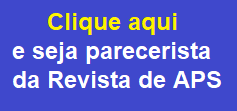GROUP PRACTICE AS AN OPPORTUNITY FOR HEALTH PROMOTION IN
Keywords:
Promoção da Saúde, Programa Saúde da Família, Grupos, Saúde de grupos específicos, Educação em SaúdeAbstract
Health promotion has been indicated as an essential element of the Family Health Program. However, in the daily work of healthcare, the family health teams have had difficulties in drawing up strategies for its practice. Considering the relevance of the implementation of practices focusing on health promotion, the objective of this article is to discuss the use of groups in the Family Health Program, as one of the opportunities for health promotion. It was drawn up from a qualitative, descriptive-exploratory study carried out in the cities of <?xml:namespace prefix = st1 ns = "urn:schemas-microsoft-com:office:smarttags" />Belo Horizonte and Contagem. Interviews were held with 28 family health team workers who quoted groups as a way of implementing health promotion initiatives. In their discourse, they showed a tendency to work with a concept of health promotion, relating it to disease prevention activities. The groups are the main initiatives focused on health promotion and, in most cases, directed at specific pathologies. It can be seen that these groups function as a work “rationalization” space, since they reduce the demand for medical and nursing consultations. The interviewees highlighted work overload as a factor which makes it difficult to carry out health promotion measures in the Family Health Program. From the description and analysis of these practices, we observe the use of traditional education methodologies, such as lectures about the change of behavior and habits through the transmission of information. We also saw little participation by the group members because very often the groups did not meet their needs, since they were more directed to the interests of the health workers. We conclude that there is a need for conceptual and practical advances in the actions of the groups, which can promote the health of the families, focusing on citizenship, autonomy and empowerment.<?xml:namespace prefix = o ns = "urn:schemas-microsoft-com:office:office" />






